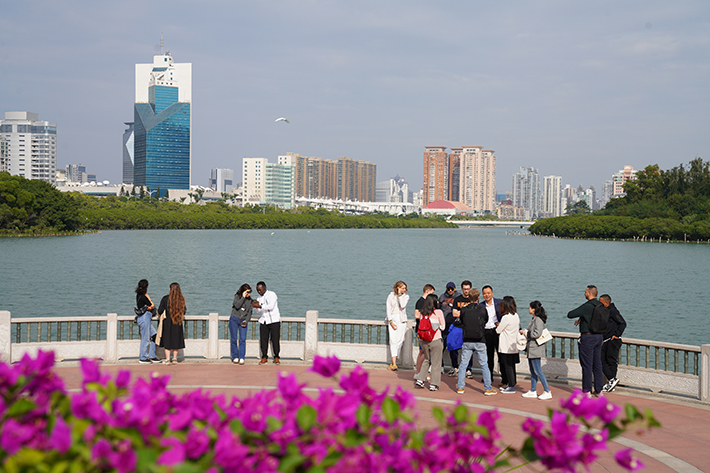|
||||||||||
| Home Nation World Business Opinion Lifestyle ChinAfrica Multimedia Columnists Documents Special Reports |
|
||||||||||
| Home Nation World Business Opinion Lifestyle ChinAfrica Multimedia Columnists Documents Special Reports |
| ChinAfrica |
| Preserving Green Lungs |
| Ecological restoration project transforms Xiamen’s Yundang Lake from a ‘stinky pond’ to a scenic paradise |
| By Xia Yuanyuan | VOL. 16 January 2024 ·2024-01-02 |

Photo taken in 2016 shows locals spending a weekend at Yundang Lake in Xiamen, Fujian Province (COURTESY)
Before moving to Xiamen to work and settle, Scott Patrick and his wife looked at a lot of photos of the city, and Yundang Lake caught their attention. “We saw beautiful pictures of the lake and immediately thought that Xiamen must be a very pleasant city to live in. So, we went there, which proved to be a good choice,” Patrick told ChinAfrica.
They have lived in Xiamen for more than six years, where Patrick, who is from the US, teaches music at an international school. Walking around Yundang Lake and seeing the clear water and white egrets up close has become a part of their daily life.
The lake covers an area of 1.6 square km right in the heart of the city, making it a true urban paradise. However, that was not always the case. In the 1970s, due to the direct discharge of untreated domestic and industrial wastewater, the lake was overrun with waste and algae, making its environment highly unpleasant.
The city began cleaning up the lake in the 1980s. After more than 30 years and four phases of cleanup, the polluted water of the lake became crystal clear. This metamorphosis encapsulates the development of ecological civilisation in Xiamen.
Ecological restoration
Fu Xunyi, senior engineer of the Yundang Lake Conservation Centre, is a local who has lived near the lake since his childhood, long before the lake became smelly.
Located in the western part of Xiamen Island, the lake was once connected to the sea and known as the Yundang Port. In the 1970s, a sea wall was built to transform the port into a virtually closed artificial lagoon. The reduction in water flow and the discharge of large quantities of industrial and domestic wastewater led to serious pollution of the lake. “In spring and summer, algae invaded the lake and waste was everywhere. The lake turned black and smelly, the fish and egrets disappeared, and people living near the lake suffered greatly,” Fu recalled.
In the 1980s, a fierce “battle” to combat pollution in the lake was launched. The Xiamen government has implemented, step by step, a series of measures to treat sewage, get rid of silt, build dikes, revitalise water bodies and beautify the environment.
“To remove the bad smell, we first had to control the source of the pollution,” said Fu. The Xiamen government has closed or relocated more than 100 polluting enterprises around the lake, including 14 major polluters. Sewage treatment plants were also built to prevent sewage from entering the lake.
To remove pollutants accumulated over the years, the government launched a large-scale dredging programme. Once the silt was treated, banks were fortified and an island inside the lake was built, which improved the water quality and helped to prevent flooding.
In order to revitalise the lake, local authorities used an innovative way involving gates on the banks to manage the flow of seawater in and out of the lake. That improved the lake’s water circulation and also helped in flood prevention.
Starting in 1999, in order to restore the lake’s ecosystem, mangrove planting and landscaping projects were carried out. Today, the lake is surrounded by lush greenery, its marine ecosystem has revived, and aquatic birds have returned.
According to data from the Yundang Lake Conservation Centre, the state of the lake’s aquatic ecosystem has been greatly improved: the concentration of ammoniacal nitrogen in the water decreased from 39.4 mg/L in 1987 to 0.076 mg/L in 2022; and 63 species of nekton, 123 species of phytoplankton, 73 species of zooplankton, and 14 species of benthos have settled in the area. A total of 95 bird species and large numbers of migratory birds, such as cormorants, spend the winter here each year.
After more than 30 years of efforts, the lake has been transformed into the “green lung” of Xiamen, attracting and welcoming many tourists to enjoy the natural beauty.

Tourists visit Yundang Lake in Xiamen, Fujian Province, on 14 November 2023 (YU JIE)
A healthy habitat
Mangroves are known as “green lungs of the oceans” and “guardians of the coasts.” By purifying water, mangroves can improve aquatic ecosystems, thus playing an important role in beautifying the ecological landscape, storing carbon and preserving biodiversity. Unfortunately, they had started to disappear from the lake due to land reclamation in the 1980s.
To restore the ecosystem, since 1999, the Yundang Lake Management Bureau (predecessor of the Yundang Lake Conservation Centre), in collaboration with the team of Lu Changyi, professor of ecology at the College of the Environment and Ecology of Xiamen University, began to conduct mangrove planting experiments around the lake.
“The mangroves should be located slightly above the water level, but there was not enough height on the banks of the lake, so it was necessary to raise them by adding soil,” said Lu, noting that the quantity of marine mud near the lake was not sufficient, and that it was necessary to look for it further away. Workers worked in difficult conditions with water up to knee or waist height at times.
“More than 2,000 people participated in the planting of mangroves around the lake, and everyone cooperated and worked hard for a long time to achieve the current mangrove coverage, which is about 26,000 square metres,” Lu said. Covering Xiatanwei park, Haicang Bay and the Huandong Sea Area, Xiamen has more than 5 million square metres of mangrove forests.
Today, the ecosystem of the lake has been greatly improved, and the goal of dike consolidation has been achieved in an ecological manner. The lake, which attracts numerous egrets in search of food and perches, is a paradise for birds. “After the egrets multiplied, the small island in the centre of the lake was renamed ‘Egret Island’,” Lu said.
Yundang Lake’s transformation from a “nauseous lake” to an “urban paradise” has become a model of ecological rehabilitation in China, earning it recognition from the United Nations Development Programme in 1993.
Reporting from Xiamen City
|
||||||||||||
| About Us | Contact Us | Advertise with Us | Subscribe |
| Copyright Beijing Review All rights reserved 京ICP备08005356号-5 京公网安备110102005860号 |